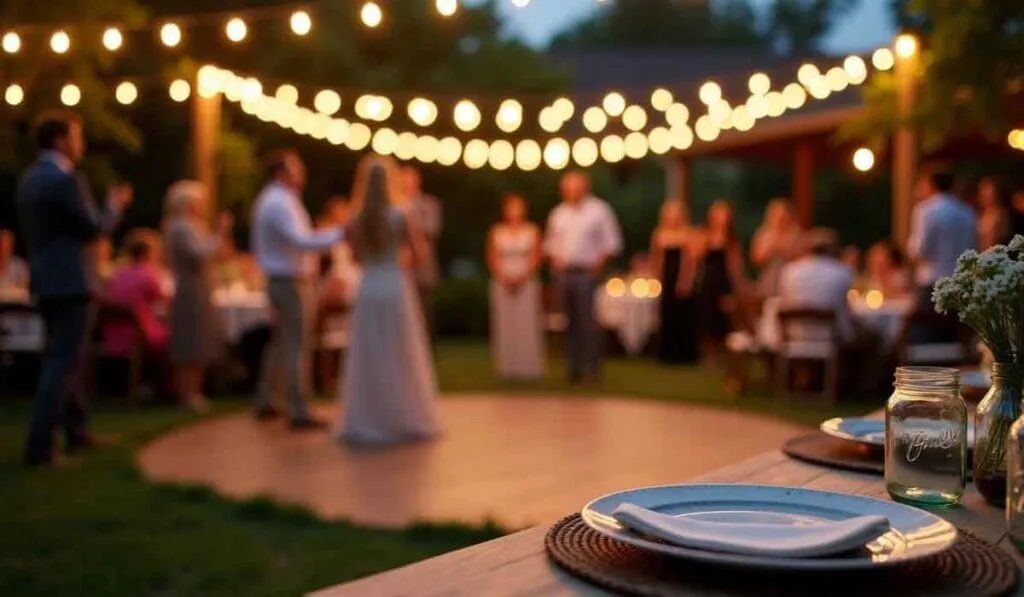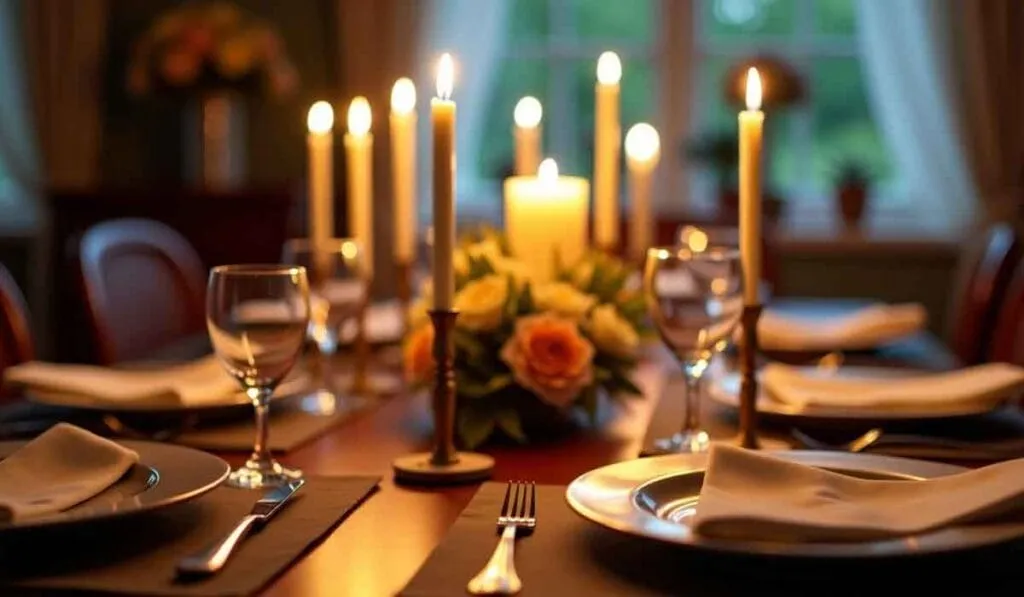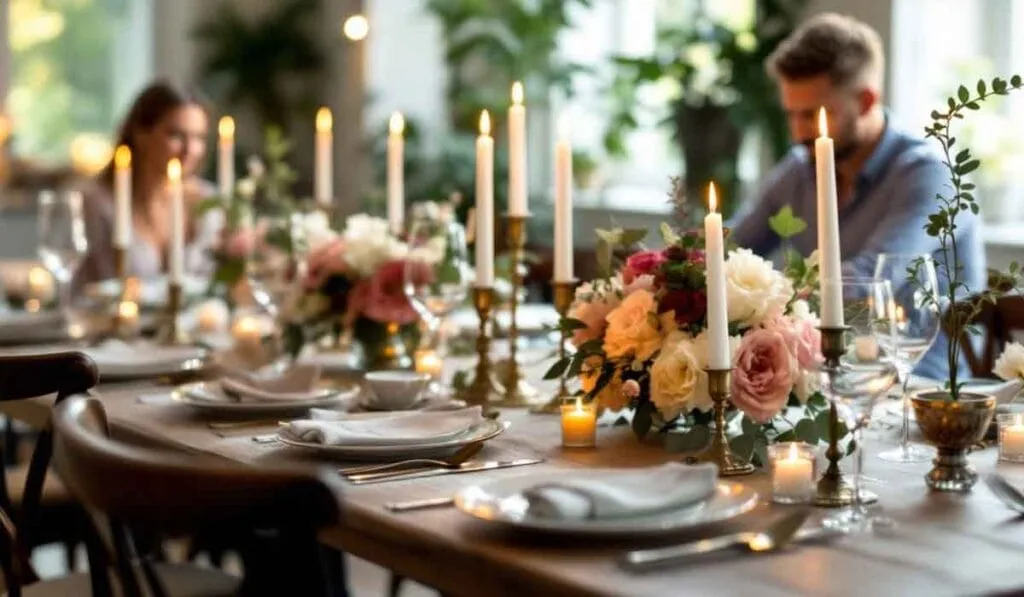
The Ultimate Guide to Giving a Great Wedding Rehearsal Dinner Speech
Are you sweating over your wedding rehearsal dinner speech?
Don’t worry, you’re not alone.
Many grooms feel nervous about this important toast.
A good speech can set the tone for the whole wedding weekend.
This guide will help you craft a memorable speech that wows your guests.
Key Takeaways
- Keep your rehearsal dinner speech short, aiming for 3-5 minutes to maintain guest engagement.
- Include a meaningful story about the couple, using appropriate humor to connect with the audience.
- Practice your speech multiple times beforehand, and use notes if needed while maintaining a natural delivery.
- Mention both members of the couple equally in your speech, highlighting their individual qualities and shared bond.
- Avoid controversial topics, mentioning exes, or overly formal language; instead, focus on positive memories and sincere well-wishes for the couple’s future.
Who Gives a Rehearsal Dinner Speech?
Traditionally, the groom’s parents host the rehearsal dinner.
They often kick off the speeches.
But don’t sweat it if that’s not your style.
These days, anyone close to the couple can grab the mic.

Best men, maids of honor, siblings, or even the bride and groom might want to say a few words.
It’s all about what feels right for your crew.
A good speech should be like a woman’s skirt: long enough to cover the subject and short enough to create interest. – Winston Churchill
The key is to keep things relaxed and fun.
There is no need for a formal lineup.
Just make sure whoever speaks knows the couple well and can share some heartfelt words.
When to Give the Speech at the Rehearsal Dinner

This sweet spot lets guests digest their food and settle in.
It’s also when people are most relaxed and ready to listen.
Don’t wait too late, though.
Some guests might start to get antsy or head out early.
Your speech order matters too.
As the groom, you might go after your parents or the best man.
Chat with the other speakers to figure out a good flow.
Keep things moving smoothly by having a plan.
You don’t want long gaps between talks or everyone trying to speak simultaneously.
A well-timed speech will make your words hit home and keep the party vibe strong.
How Long Should a Rehearsal Dinner Speech Be?

Keep your rehearsal dinner speech short and sweet.
Aim for 3 to 5 minutes at most.
This gives you enough time to share a meaningful story and express your feelings without boring guests.
Lengthy speeches can dampen the mood at a fun pre-wedding party.
Stick to one main point or anecdote rather than trying to cover too much ground.
You aim to set a warm, celebratory tone – not deliver a long monologue.
Practice your speech beforehand to nail the timing.
Speaking slower than normal, 3 minutes equals roughly 390 words.
Jot down key points on note cards to stay on track.
Remember, you’re talking to friends and family in a relaxed setting.
Don’t stress about being perfect.
A heartfelt, brief toast will hit the spot and keep the party rolling.
Tips for Writing a Great Wedding Rehearsal Dinner Speech
Want to wow the crowd at the rehearsal dinner?
Here are some tips to help you craft a memorable toast that’ll have everyone raising their glasses.
Start with an introduction and welcome

Kick off your speech with a warm hello to everyone.
You’re the host, so make folks feel at home.
Introduce yourself and share your connection to the happy couple.
A simple “Welcome, I’m John, the groom’s dad” works great.
Keep it short and sweet – you’ve got more good stuff coming.
Next, thank the guests for being there.
Mention how much it means to the bride and groom.
You might say, “We’re thrilled you’re all here to celebrate Jane and Bob’s love.”
This sets a friendly tone for your speech.
Now, you’re ready to begin the main part of your toast.
Let’s discuss telling a meaningful story that will engage your audience.
Tell a meaningful story

Stories make speeches come alive.
Pick a tale that shows why the couple is special.
Maybe it’s how they met or a funny moment you shared.
Keep it short and sweet. Focus on the good stuff that makes everyone smile.
Your story should highlight the couple’s love and bond.
Don’t go overboard with details. Stick to the main points that matter.
Make sure your story is appropriate for all ages.
Avoid inside jokes that only a few people will get.
A good story will touch hearts and create lasting memories.
It’ll make your speech stand out from the rest.
Use humor appropriately

Laughter is a great way to break the ice at a rehearsal dinner.
You can sprinkle in some light jokes or funny stories about the couple.
But tread carefully—keep it clean and kind.
No embarrassing tales or inside jokes; only a few will get.
A good rule of thumb: skip it if you’d feel weird saying it to your grandma.
Aim for warm chuckles, not awkward silence.
Humor helps the crowd relax and connects you with the guests.
But don’t try to be a stand-up comic.
Your main goal is to honor the couple, not steal the show.
Mix in heartfelt moments with the laughs.
A touching story followed by a gentle joke works well. Just keep it natural and true to your personality.
Be heartfelt and sincere

Your speech should come from the heart.
Don’t just say nice things because you think you should.
Share real feelings about the couple.
Talk about why they’re great together or how they’ve grown.
You might mention a time they helped you or made you proud.
Your words will mean more if they’re honest and personal.
Keep your tone warm and genuine.
Avoid jokes that might fall flat or stories that could embarrass you.
Instead, focus on positive memories and hopes for their future.
If you have any wisdom about love or marriage, you can share it.
Just be yourself and speak from a place of care and support for the happy couple.
Mention both members of the couple

In your speech, spotlight both the bride and groom equally.
Talk about their individual qualities and how they complement each other.
Share a story that shows their bond or how they’ve grown together.
This approach makes your toast more balanced and heartfelt.
It also shows you care about them as a unit, not just one person.
Remember to tie their traits to their future together.
You might say how her kindness and his humor will help them through tough times or how their shared love of adventure will lead to an exciting life.
By focusing on both, you’ll create a more rounded and meaningful toast.
What to Avoid in a Rehearsal Dinner Speech
Steer clear of certain topics in your speech.
You don’t want to make guests cringe or the couple blush.
Avoid mentioning exes or controversial topics

Avoid hot-button issues in your speech.
Your words should bring people together, not drive them apart.
Also, avoid talking about exes or touchy subjects.
These topics can make folks uncomfortable and detract from the happy mood.
Instead, focus on positive memories and good wishes for the couple’s future.
You want everyone to feel good and celebrate, not squirm in their seats.
Keep things light and fun.
Stick to stories that show the couple’s best qualities or funny moments you’ve shared.
If you’re unsure if a topic is okay, it’s best to skip it.
You can always run your speech by a trusted friend first to get their take.
The goal is to make the bride and groom feel loved and supported as they start their new life together.
Your words should add to the joy of the occasion, not cause any drama or hurt feelings.
Don’t make it too long or overly formal

Keep your speech short and sweet.
No one wants to hear you ramble on for ages.
Aim for about 3-5 minutes tops.
That’s plenty of time to share a funny story and offer heartfelt words.
Skip the fancy language, too.
This isn’t a business meeting or a college lecture.
Talk like you normally would with friends and family.
Your natural voice will come across as more genuine and engaging.
Forget stuffy formalities. This is a celebration, not a board meeting.
Crack a few jokes if that’s your style.
Share a quick, amusing tale about the couple.
But don’t go overboard – you’re not doing a standup routine.
Strike a balance between light-hearted fun and sincere emotion.
You aim to make people smile and maybe shed a happy tear or two.
Keep things moving and wrap it up before folks start checking their watches.
Practice and Delivery Tips
Ready to nail your speech? Let’s talk about how to practice and deliver it like a pro.
These tips will help you feel cool as a cucumber when it’s your turn to speak.
Practice multiple times beforehand
You’ve got to nail your rehearsal dinner speech. Don’t wing it!
Grab your notes and practice in front of a mirror or your pet.
Read it out loud several times.
This helps you smooth out any tongue twisters and find the right pace.
You’ll feel more at ease in front of the crowd.
Time yourself as you practice. Aim for about 3-5 minutes.
Too short, and you might miss key points.
Too long, and folks might start checking their watches.
As you run through it, tweak parts that don’t flow well.
The more you practice, the more natural you’ll sound on the big night.
Your confidence will shine through, making your speech a hit with the wedding party.
Keep a calm and relaxed tone.
After you’ve practiced your speech, focus on staying composed during your delivery.
A calm tone sets the right mood for your rehearsal dinner speech.
Take deep breaths before you start talking.
This simple technique helps steady your nerves and voice.
Speak slowly and clearly, as if you’re chatting with good friends.
Pause between key points to let your words sink in.
Your relaxed demeanor will positively influence your audience.
They’ll be attentive to hear your stories and jokes about the happy couple.
Don’t rush through funny parts or touching moments.
Let your natural rhythm shine through.
If you stumble, smile and keep going.
The wedding party will appreciate your easygoing approach to this special toast.
You’re among family and friends who want you to succeed.
Use notes if needed, but stay natural
Keeping calm is key, but don’t forget about your notes.
It’s okay to bring a reference sheet to the podium.
Write down key points or even your full speech if it helps you feel more at ease.
Just don’t read word-for-word from the page.
Glance at your notes when needed, then look up and connect with the crowd.
Your goal is to sound genuine, not like you’re reciting lines.
Mix eye contact with quick peeks at your notes.
This balance will help you stay on track without losing that personal touch.
Remember, the guests want to hear from you, not your paper.
So use those notes as a safety net, but let your true feelings shine through.
Your natural charm and sincerity will make the speech memorable, even if you need some help remembering the details.
Examples of Rehearsal Dinner Speech Styles
Rehearsal dinner speeches come in all shapes and sizes.
You’ll hear different styles from parents, best friends, and other loved ones.
Parent speeches
Parent speeches often steal the show at rehearsal dinners.
As the groom-to-be, you’ll likely hear from your folks and your future in-laws.
These talks usually mix humor, heartfelt moments, and family stories.
Your dad might share a funny tale from your childhood, while your mom could get teary-eyed about her “little boy” growing up.
Don’t worry if things get a bit mushy – it’s all part of the fun!
Your future in-laws might use this time to officially welcome you to the family.
They could share their first impressions of you or talk about how happy you make their daughter.
These speeches tend to be shorter than those at the main wedding, so everyone can relax and enjoy the evening.
Best man or maid of honor speeches
As the best man or maid of honor, you’ve got a significant task ahead.
Your speech will influence the atmosphere for the entire wedding weekend.
Stay calm, though! Keep things light and fun.
Share a humorous anecdote about the bride or groom.
You might talk about how they met or fell in love. Just ensure it’s not too embarrassing!
Your speech should be concise and engaging.
Aim for about 3-5 minutes at most.
Any longer and you might lose people’s attention.
Begin by introducing yourself and explaining how you know the couple.
Then, move into your main points.
Conclude with a heartfelt toast to the newlyweds.
Make sure to practice a few times before the big day.
You’ll feel more confident and natural when it’s time to deliver your speech.
Family and friend speeches
Family and friend speeches add a personal touch to your rehearsal dinner.
These talks often bring laughter and tears.
Your college roommate might share a funny story about your first date.
Your sister could recall a childhood memory that shows your growth.
These speeches paint a picture of who you are as a couple.
They give guests a peek into your lives and relationships.
Keep in mind that these talks should be short and sweet.
Ask speakers to aim for 3-5 minutes at most.
Brief chats keep the energy up and avoid boredom.
You can guide your loved ones on what to say.
Suggest they focus on happy times and avoid embarrassing tales.
Good speeches mix humor with heart.
They celebrate your love story and the journey ahead.
Conclusion
With preparation and practice, you can deliver an excellent rehearsal dinner speech.
Follow a few key guidelines to make a lasting impression.
Keep your speech concise, heartfelt, and genuine.
Include a humorous anecdote, but maintain balance.
The focus should be on celebrating the couple and their relationship.
Your speech will contribute to the happiness of their momentous occasion.
Take a moment to compose yourself, offer a warm smile, and propose a toast to the soon-to-be-married couple!
FAQs
How long should a rehearsal dinner speech be?
A rehearsal dinner speech should be 3-5 minutes long. This length provides enough time to share a meaningful story and express heartfelt sentiments while maintaining guest engagement. Speaking at a normal pace this equals approximately 390 words. Keeping the speech concise helps maintain the party’s energy and prevents guests from becoming restless.
Who traditionally gives speeches at a rehearsal dinner?
Traditionally, the groom’s parents, who often host the rehearsal dinner, begin the speeches. However, modern rehearsal dinners are more flexible, and speeches can be given by:
- Best man and maid of honor
- Siblings of the couple
- Close family members and friends
- The bride and groom themselves The key is ensuring speakers know the couple well and can share meaningful, personal stories.
What should you avoid in a rehearsal dinner speech?
When giving a rehearsal dinner speech, avoid:
- Mentioning exes or past relationships
- Controversial topics or political statements
- Overly formal language or business-like tone
- Inside jokes that only a few guests will understand
- Embarrassing stories that might make the couple uncomfortable
- Lengthy monologues exceeding 5 minutes. Instead, focus on positive memories, sincere well-wishes, and appropriate humor that celebrates the couple’s relationship.




